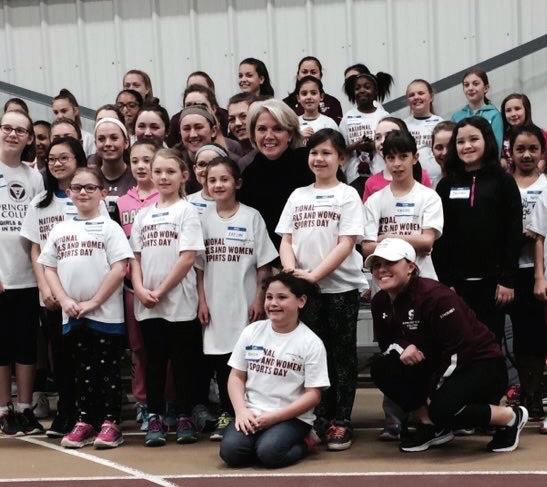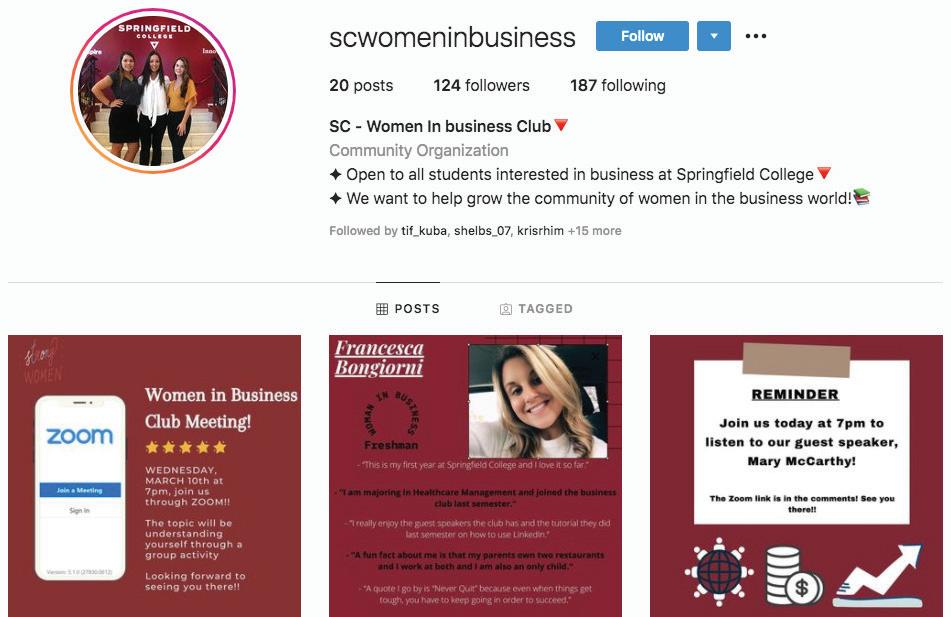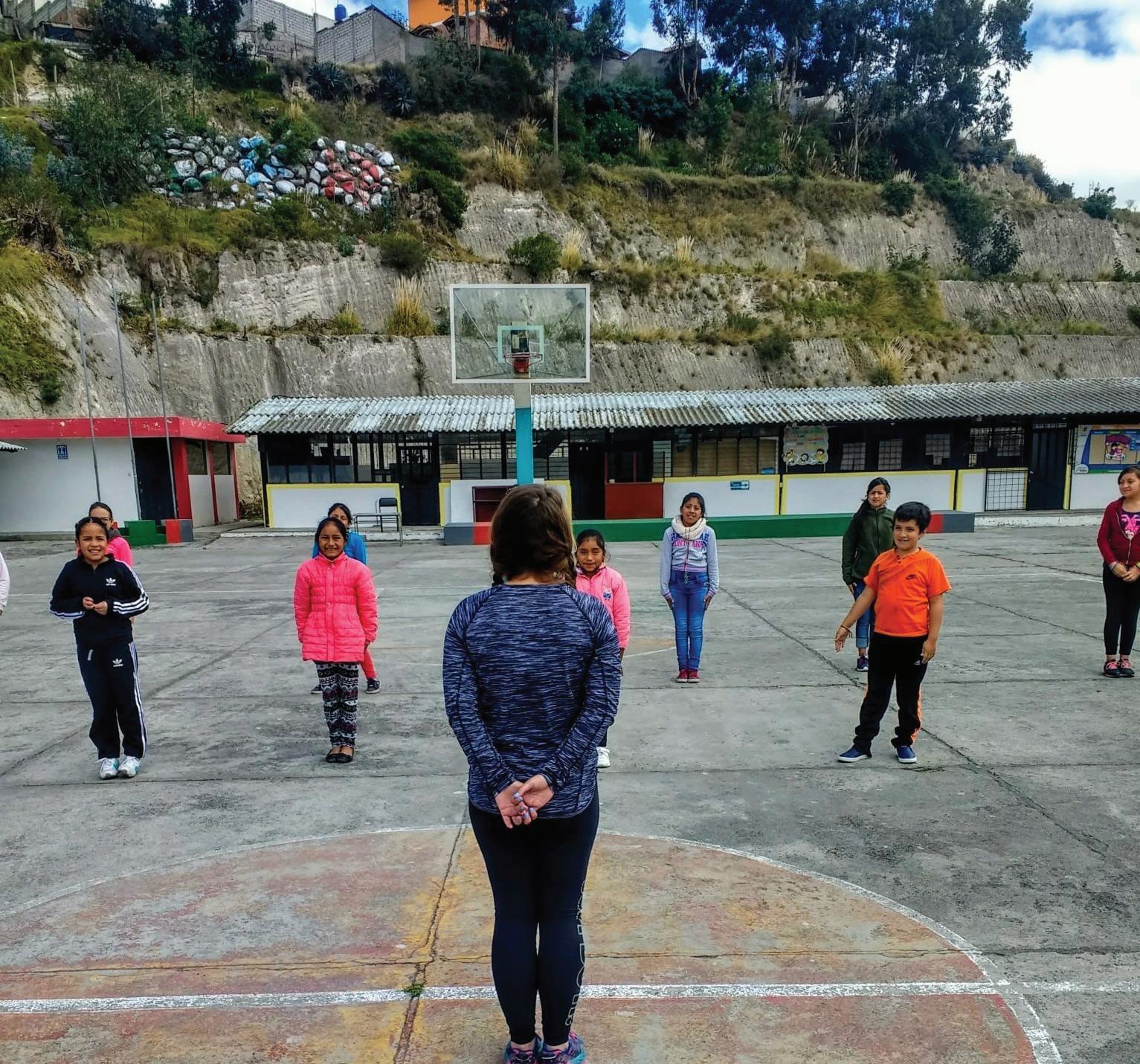
8 minute read
Part two of Springfield College’s connection with the Peace Corps
The experience of a lifetime
Getting involved with the Peace Corps is a decision that can lead to lifelong memories and unique opporunties to help others.
Advertisement
By Irene Rotondo @irenerrotondo
Peace Corps Volunteers range from virtually every background imaginable -- the one constant, however, is their shared love of community and service to others.
The stories of each individual who made the decision to volunteer are all unique, given there is no one path a person can take on their way to service or affiliation with the organization.
There are many ways to become involved; one particularly intriguing way, for students especially, is to become a campus ambassador.
Randi Dermo served in Ecuador from 20172019, and is the Regional Recruiter for Vermont and Massachusetts. Dermo is looking for a student to represent the Peace Corps on the College’s campus.
“Campus ambassadors work closely with the recruiters in the area, to develop and foster relationships between the Peace Corps and new and diverse student organizations on Springfield’s campus,” said Dermo.
“The application goes live on March 1, and I would love to work closely with Springfield students and spread the word of Peace Corps. It’s a great opportunity for an undergraduate to have connections with federal government agencies, work to promote an organization’s mission, act as a liaison, so it’s also a really great opportunity for the student,” said Dermo.
Other than becoming a campus ambassador, another obvious way to get involved with the Peace Corps is becoming an in-country volunteer. It is unsurprising that there are even a few alumnus of Springfield College that have gone on to serve with the Peace Corps, and many volunteers who now associate themselves with the College after their service has ended.
During Dermo’s service, she worked with English teachers at a K-12 public school. One of her initiatives involved creating a curriculum for a cheerleading summer camp whose goal was to teach English through cheerleading. Students from fourth-through-sixth grade were invited to attend, with 50 students partaking overall.
“It was just really a great experience, I collaborated on carrying out this project with several of the English teachers at the school, and a couple of other volunteers in the area came to help me out, and the students learned cheers in English,” said Dermo.
“They also learned a choreographed dance to Taylor Swift’s ‘Shake It Off,’ and they participated in gender equality sessions along with team building exercises. It was just a really great way to bond with the students,” she said.
Other volunteers from the Peace Corps have a variety of missions, similar to Dermo’s, of youth development programs.
Tammen Nicholson (G’10) is a graduate of Springfield College’s Sports Management program. Nicholson served with his wife, Bridgit, from 2015-2017 in Lesotho, South Africa, working on youth development projects. Nicholson said that he and his wife made the decision to join a few years after already graduating from college, making them a sort of anomaly amongst their peers.
“I think for most people, they wind up doing Peace Corps immediately
Randi Dermo with students in Ecuador. (Photo Courtesy of Randi Dermo)
after graduation, so we were outliers in the fact that we weren’t just graduates,” said Nicholson.
“But we weren’t also a couple who was in their sixties that had just retired and wanted to do Peace Corps, so it was kind of unique to have that professional experience before we went overseas.”
Nicholson said that he faced some difficulties upon telling people of their decision, especially given that he and Bridgit had already been in the workforce for some time.
“One thing that people would say to me was, ‘Oh, you’re taking two years off from life to join Peace Corps,’ because by that time I had been working professionally,” said Nicholson.
“I kind of had to correct people often and be like, ‘I’m not taking time off, because I studied Sport Management, and this is maybe the first time I’m getting a chance to use my degree,’ because I’m teaching sport development classes, and how we can use soccer in HIV prevention techniques... that would raise awareness to public health campaigns.
“My favorite experience was that you can really tie in what your personal interests are to whatever your project is and put your own mark on that,” added Nicholson.
Nicholson recalled working as an intern during his time as an undergraduate at Springfield in a nonprofit office in New York. There, he learned firsthand how his Sport Management degree could be used in outreach programs for the community, rather than in just formal business settings.
During his service in Lesotho, Nicholson worked to raise awareness of sexual reproductive health education. He taught children the importance of healthy living and HIV awareness, an educational opportunity the children received because their community asked the Peace Corps for a volunteer to come and teach that exact topic.
“The thing that I’ve always liked about Peace Corps is that when the host community applies for a volunteer, the host community says, ‘I want a volunteer to come in to teach HIV medication practices, or teach sexual reproductive health courses,’ and that still needs to be approved by the Peace Corps, and they still need to agree and to offer to provide a volunteer,” said Nicholson.
“It’s totally different than an NGO coming in and saying, ‘We’re going to give you sexual reproductive health, whether or not the community thinks that’s a priority,’” he added.
Lauren Bishop, though not a graduate of Springfield College (she actually graduated from UMass with a Bachelor’s in Biology), was another volunteer who focused on youth development during her time in-country. She served in Bulgaria from 2013-2015 at a small orphanage.
“I was a youth development volunteer for Youth at Risk, and I was placed in an orphanage in the center for social support-- it was a small town, maybe like 5,000 people, and an hour outside of the capitol,” said Bishop.
“I worked with primarily Roma-- they’re the minority population in eastern Europe. I worked with some social workers, a psychologist, ran activities at a small orphanage. [The children were] 4-18 years old, about 15 or 16 kids, and I spent two years there, 27 months,” she added.
Bishop says that she initially had difficulty learning a second language, but the intensive three-month training volunteers endured was enough for her to pick up Bulgarian. One of her favorite experiences was learning that second language and subsequently building relationships while using the country’s native tongue.
“You’re thrown in-site after three months, and I didn’t have anyone on my site that spoke English, until I found out in like the last two months that my neighbor’s daughter spoke English,” laughed Bishop.
“I don’t know if it would be an experience, necessarily, but just like a collective experience really developing a familiarity with a second language. You can talk to just about anyone and after two years you surprise yourself,” she added.
When her service ended in 2015, Bishop decided that her next step would be to gain her Master’s degree from a Peace Corps fellowship program. After searching various programs and schools to complete them with, Bishop landed on Springfield College’s Paul D. Coverdell Fellowship. She was able to graduate from the program in 2018, opening up a spot for the next Peace Corps volunteer to come through.
That next volunteer was Erin Sarris. Sarris had served in Romania from 1995-1997 teaching English. After completing her undergraduate degree from University of New Hampshire, Sarris left just days after graduation for Romania. She had first heard about the Peace Corps from her campus recruiter, who was then able to help her set an academic track in college that would aid her in her mission to serve.
Sarris took classes on teaching English as a foreign language and as a second language, and did some tutoring on the subject as well. This was just enough to prepare her for the experience of her lifetime.
Sarris recalled staying with her host family in the beginning of her service as a time where she was first introduced to Bulgarian culture. The family had a nineyear-old son, and Sarris said that the family “bent over backwards” to make her feel comfortable,

Tammen Nicholson during his time in Lesotho. (Photo Courtesy of Tammen Nicholson)
Cooper
continued from
Page 3
today. After a long break from teaching, Cooper is now teaching the YMCA Leadership course this semester at Springfield.
“They’ve had a really tough hit during the pandemic,” Cooper explained. “The course I’m teaching is designing the Y of 2025.” In this course, students are looking at how to engage members post-pandemic.
Cooper is hopeful that the future will bring positive change for women in male-dominated industries. “We are more than capable of leading an institution. We just bring our own gifts to the table.”
Going forward, Cooper hopes that some of the barriers women face in the workplace will start to diminish. She encourages men to realize and appreciate that women will be leaders, and that they will excel in these roles.
As for her career, Cooper does not plan on slowing down anytime soon. When she started at University of Delaware, she was originally on a pre-law track. This goal was disrupted once she decided to pursue a career in higher education.
“I feel like you’re never too old to get another degree to advance to the next step,” she said. With online programs available, Mary Beth Cooper hopes to earn her JD and use it to help women and families with contracts and housing assignments.
“I don’t want it to impact my job here,” Cooper said. She fully intends to continue serving the Springfield College community, and is eager to make more connections in the future once the campus is totally back in person with no restrictions.
“I feel really, really lucky to be the president here,” Cooper said. There may be much uncertainty with the world going forward, but for now, Dr. Cooper plans on continuing her role here at Springfield with the student body’s best interest in mind.

President Cooper at a past National Girls and Women in Sports Day event on campus. (Photo Courtesy of Mary-Beth Cooper)



